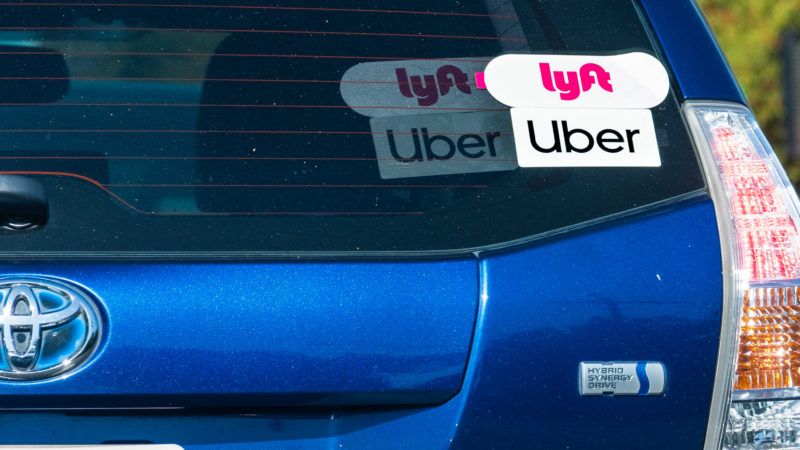Coronavirus Has Devastated Uber and Lyft's Business. Now California Is Suing Them.
A lawsuit filed yesterday by California Attorney General Xavier Becerra accuses the companies of misclassifying their drivers as independent contractors.

Things are going from bad to worse for ridesharing companies during the coronavirus pandemic. Business is way down, while legal troubles continue to mount.
On Tuesday, California Attorney General Xavier Becerra along with the city attorneys of Los Angeles, San Francisco, and San Diego, filed a lawsuit against Uber and Lyft. Their complaint accuses the companies of misclassifying their drivers as independent contractors, not employees, in violation of the state's famous gig economy law, Assembly Bill 5 (A.B. 5).
The lawsuit is the latest flashpoint in rideshare companies' long battle with state and local governments over what rules should govern their relationship with their drivers.
"Californians who drive for Uber and Lyft lack basic worker protections—from paid sick leave to the right to overtime pay," Becerra said in a statement. "Sometimes it takes a pandemic to shake us into realizing what that really means and who suffers the consequences."
Tuesday's lawsuit accuses the two companies of a litany of local and state labor code violations stemming from their alleged misclassification of drivers as independent contractors, including not paying minimum wage, not paying overtime, not offering sick leave and meal breaks, and not paying into the state's unemployment and disability insurance funds.
"We will contest this action in court, while at the same time pushing to raise the standard of independent work for drivers in California," an Uber spokesperson told The New York Times, promising to fight the lawsuit.
"We are looking forward to working with the Attorney General and mayors across the state to bring all the benefits of California's innovation economy to as many workers as possible, especially during this time when the creation of good jobs with access to affordable healthcare and other benefits is more important than ever," Lyft said in a more conciliatory statement to Reason.
California's A.B. 5, which codified an earlier state supreme court decision, went into effect in January 2020. It lays out three conditions that a worker must meet to be considered an independent contractor. This three-part test, known as the ABC test, requires a worker to be free from "control or direction" in offering their services, be doing work outside the normal scope of business of the entity hiring them, and be customarily engaged in the kind of work they are being hired to do.
Workers who fail even one leg of this test are considered employees, a status that entitles them to certain benefits and protections while also imposing a long list of regulations on their relationship with their employer.
Rideshare companies have employed a range of arguments to avoid having to classify their drivers as employees, which they say would be both incredibly costly and destroy the flexible work arrangements that make these app-based services appealing to many drivers.
Bloomberg reports that reclassifying drivers as employees would raise rideshare companies' costs by as much as 20 percent.
The companies insist that their status as tech firms who only connect drivers and riders, but who don't tell drivers when or where they have to work, means those offering rides on their platform don't qualify as employees under the ABC test.
In addition, Uber and Lyft have sued to stop A.B. 5 from going into effect. The two companies have also been pouring money into a state ballot initiative that would explicitly exempt their drivers from the law.
In their lawsuit, Becerra et al. argue that Lyft and Uber are fundamentally transportation—not tech—companies, meaning drivers are performing work that is core to their business, and are therefore their employees and entitled to all the benefits that status entails.
The passage and implementation of A.B. 5 have been rife with controversy as everyone from porn stars to truckers have pointed out ways that their reclassification as employees has cost them valued flexibility and income.
Trying to forcibly reclassify rideshare drivers as employees now will likely be even more disruptive given the dire circumstances rideshare companies find themselves in due to COVID-19.
One analytics firm estimates spending on rideshare services has fallen 83 percent during the pandemic, reports the Times. Lyft just announced that it is laying off 17 percent of its workforce. Uber is reportedly considering doing the same.
If Becerra's lawsuit is successful, he might end up winning employment protections for drivers, while putting their newly classified employers out of business.
Rent Free is a weekly newsletter from Christian Britschgi on urbanism and the fight for less regulation, more housing, more property rights, and more freedom in America's cities.


Show Comments (55)